 Vintage cars show kicks off in London
Vintage cars show kicks off in London
 Gorgeous scenery in NE China
Gorgeous scenery in NE China
 Picturesque Barkol grassland in Xinjiang
Picturesque Barkol grassland in Xinjiang
 Small Wild Goose Pagoda - A World Cultural Heritage Site along the Silk Road
Small Wild Goose Pagoda - A World Cultural Heritage Site along the Silk Road
 Maritime Silk Road Luxuries of the Han Dynasty
Maritime Silk Road Luxuries of the Han Dynasty
 Ciao! Chinese beauties!
Ciao! Chinese beauties!
 An eye feast: BFA freshmen registration
An eye feast: BFA freshmen registration
 Top 10 most lavish weddings
Top 10 most lavish weddings
 Most amazing chi-pao beauties
Most amazing chi-pao beauties
 Chinese lingerie brand arrives in Las Vegas
Chinese lingerie brand arrives in Las Vegas
On August 18, a news conference was held in Beijing for Wa Tribe, a tour jointly launched by China Institute of Culture Limited, the Department of Culture of Yunnan Province, and the municipal government of Pu'er City. Wa Tribe revolves around the pristine songs and dances of the Wa nationality. During the conference, over 30 media outlets, including People's Daily, Economic Daily, China Daily, China National Radio, www.xinhuanet.com, www.people.com.cn, www.china.com.cn, and Tencent, came together to focus their attention on Wa Tribe, with a view to learning more about the diverse culture and limitless charm reflected in the city's slogan of "Godsent Pu'er, Tea Source of the World".
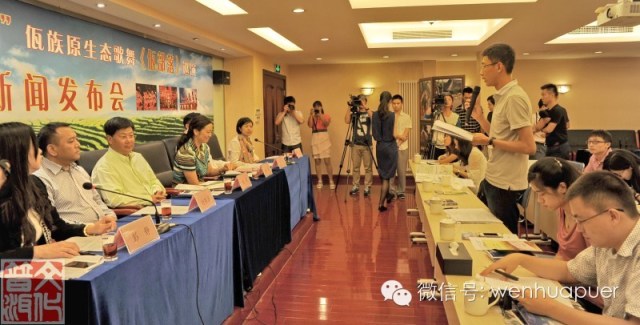
Journalists from the media outlets were deeply attracted by the culture and development of Pu'er while learning about the Wa Tribe tour.
Journalist: Could you tell us something about the long-term vision of Pu'er for its industries?
Yang Lin, Vice Mayor of Pu'er: As for our plans for the development of industries in Pu'er, we will take advantage of the city's abundant resources and its favorable geographic location to cultivate five big industries each of which is 100 billion yuan in value, namely the biological industry, the leisure, vacationing and health care service industry, the clean energy industry, the modern forestry industry, and the organic food industry; and 5 special industries each of which is 10 billion yuan in value, namely Pu'er tea, coffee, rubber, rosin, and ore processing. At the same time, we will build ten 100-million specialized markets, namely those for Pu'er tea, Pu'er coffee, rosin, rubber, household necessities, hardware and electromechanical products, agricultural and mining machinery, building materials, biological medicinal materials, medical instruments, and finance services. In short, Pu'er will be built into a bridgehead oriented towards Southeast Asia and South Asia.
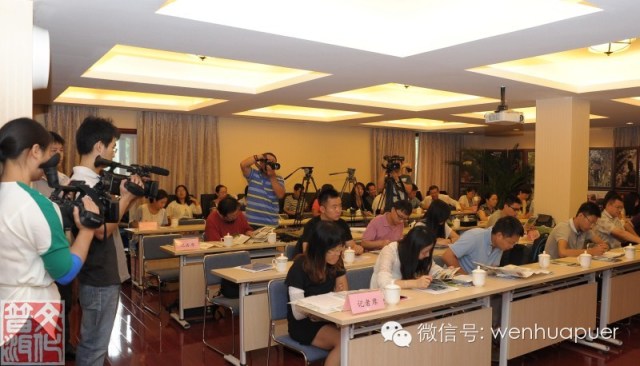
Journalist: Why has Yunnan Province launched Wa Tribe as a key project in its effort to let its provincial culture "go out"?
Huang Ling, Vice Director of the Department of Culture of Yunnan Province: As part of the province's effort to build its culture industry, Wa Tribe is not only a song and dance show produced to showcase the unique pristine songs and dances of some nationalities in Yunnan, but also another quality work launched after Dynamic Yunnan. The Wa Tribe is launched to enhance the cultural influence of the nationality, elevate its cultural soft power, increase its self-confidence in culture, and promote its cultural innovation and development.
Journalist: Could you say something about the effort made to let Pu'er culture "go out"?
Zhao Liantao, Director of the Department of Publicity of Pu'er City: We have planned to let Pu'er culture go out by taking a two-step approach. Firstly, we’ll take a pearl necklace strategy. We are trying to unearth the cultural essence of each nationality and make each cultural unit perfect, forming different pearls on a single pearl necklace. The Wa Tribe we introduced today is just a bright pearl in China's splendid national culture. The second step we take is to build platforms to go out. This step involves two parts: build an international platform and a domestic platform. As for the building of international platform, we have held such events as the first China Pu'er International Country Music Festival, and the Mojiang International Twins Festival, spreading Pu'er's diverse national culture and ecological culture around the world. As for the domestic platform, Pu'er City has 1 district and 9 counties under its jurisdiction. The nine counties are all autonomous ones and have built their individual cultural festivals. By adopting the pearl necklace strategy and building two exchange platforms, Pu'er culture is going across China and even to the world consciously and confidently.
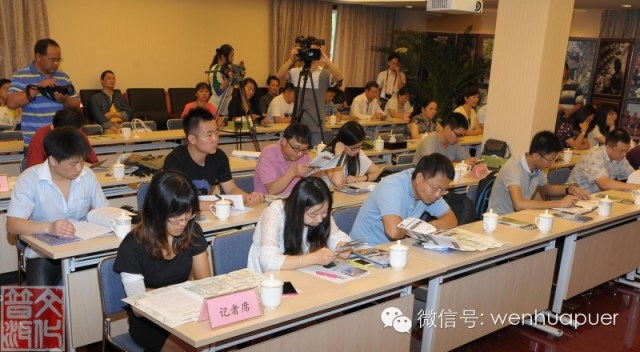
Journalist: I have learned that the Ancient Tea Forest on Jingmai Mountain is applying for the UNESCO World Heritage Site. Could you tell me what advantage it enjoys in its ongoing effort? How is the effort going now?
Zhao Liantao, Director of the Department of Publicity of Pu'er City: The Ancient Tea Forest on Jingmai Mountain is the best reserved, oldest, largest artificially cultivated ancient tea forest in the world. In fact, it has a unique ethnic village of a long history and boasts ancient tea growing and preparing techniques, an unparalleled forest system, and a nice natural environment with good hydrographic and climatic conditions. Thanks to its unique characteristics, a value system has formed around the Ancient Tea Forest on Jingmai Mountain, enabling it to apply for the World Cultural Heritage.
At present the effort is going smoothly. Since 2010, when the effort first began, the Jingmai Mountain Ancient Tea Garden and Tea Culture have been placed under the Globally Important Agricultural Heritage Systems (GIAHS) Initiative by the Food and Agriculture Organization (FAO) of the United Nations as a Globally Important Agricultural Heritage System. Furthermore, Jingmai Mountain was proclaimed as a Key Cultural Relic Protected at the National Level by the State Council, and was included in China's List of Candidates for the Status of UNESCO World Heritage Site. In May 2013, the International Tea Committee formally conferred the title of "Tea Source of the World" on Pu'er, which attests to Pu'er's status as the recognized source of origin of tea in the world, meaning tea originated in Pu'er City, Yunnan Province, China. It is fair to say that the effort by the Ancient Tea Forest on Jingmai Mountain to apply for the status of UNESCO World Heritage Site is on the verge of achieving its goal.
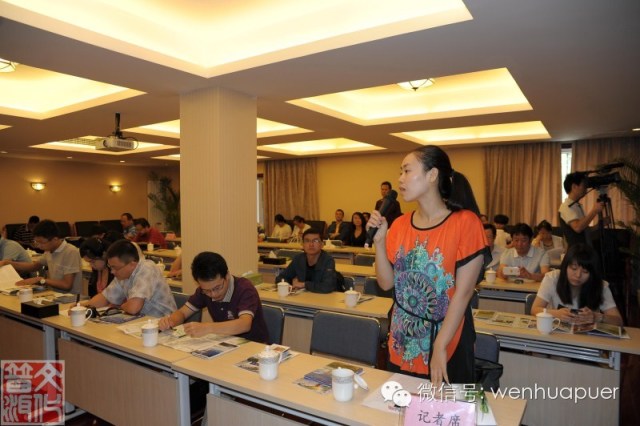
Journalist: From an ordinary spectator's perspective, what highlights do Wa Tribe have?
Yang Yu, Party Committee Secretary of Ximeng County: All performers of Wa Tribe are kids from the rural areas who have never received formal training at a college, and they learn to dance by becoming immersed in those songs and dances. In itself, the Wa nationality dance tends to fully express what it wants to express and to be bold and unrestrained, thus displaying a high artistic charm. Wa Tribe reflects man's fear of nature as well as the holding dear of the feelings between people. This is the central idea Wa Tribe wants to express.
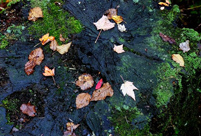 Appreciating red leaves in early autumn
Appreciating red leaves in early autumn Apple introduces larger iPhones, new watch
Apple introduces larger iPhones, new watch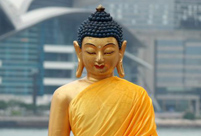 Chinese Buddhist Canon blesses Hong Kong
Chinese Buddhist Canon blesses Hong Kong Beautiful postgraduate teaches in remote area
Beautiful postgraduate teaches in remote area Amazing Guinness World Records
Amazing Guinness World Records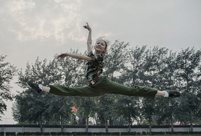 Freshmen of Beijing Dance Academy take military training
Freshmen of Beijing Dance Academy take military training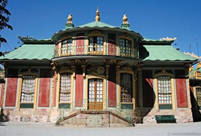 Chinoiserie architectures overseas
Chinoiserie architectures overseas Top 10 world's highest-paid models 2014
Top 10 world's highest-paid models 2014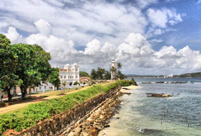 Following the step of Zheng He
Following the step of Zheng He Childhood on grassland
Childhood on grassland Traditional Zhou dynasty style proposal
Traditional Zhou dynasty style proposal Tibetan students embrace new semester
Tibetan students embrace new semester Peace Mission 2014 joint military drill
Peace Mission 2014 joint military drill Sand painting world
Sand painting world Mind-boggling building looks like 'house of cards'
Mind-boggling building looks like 'house of cards'Day|Week|Month